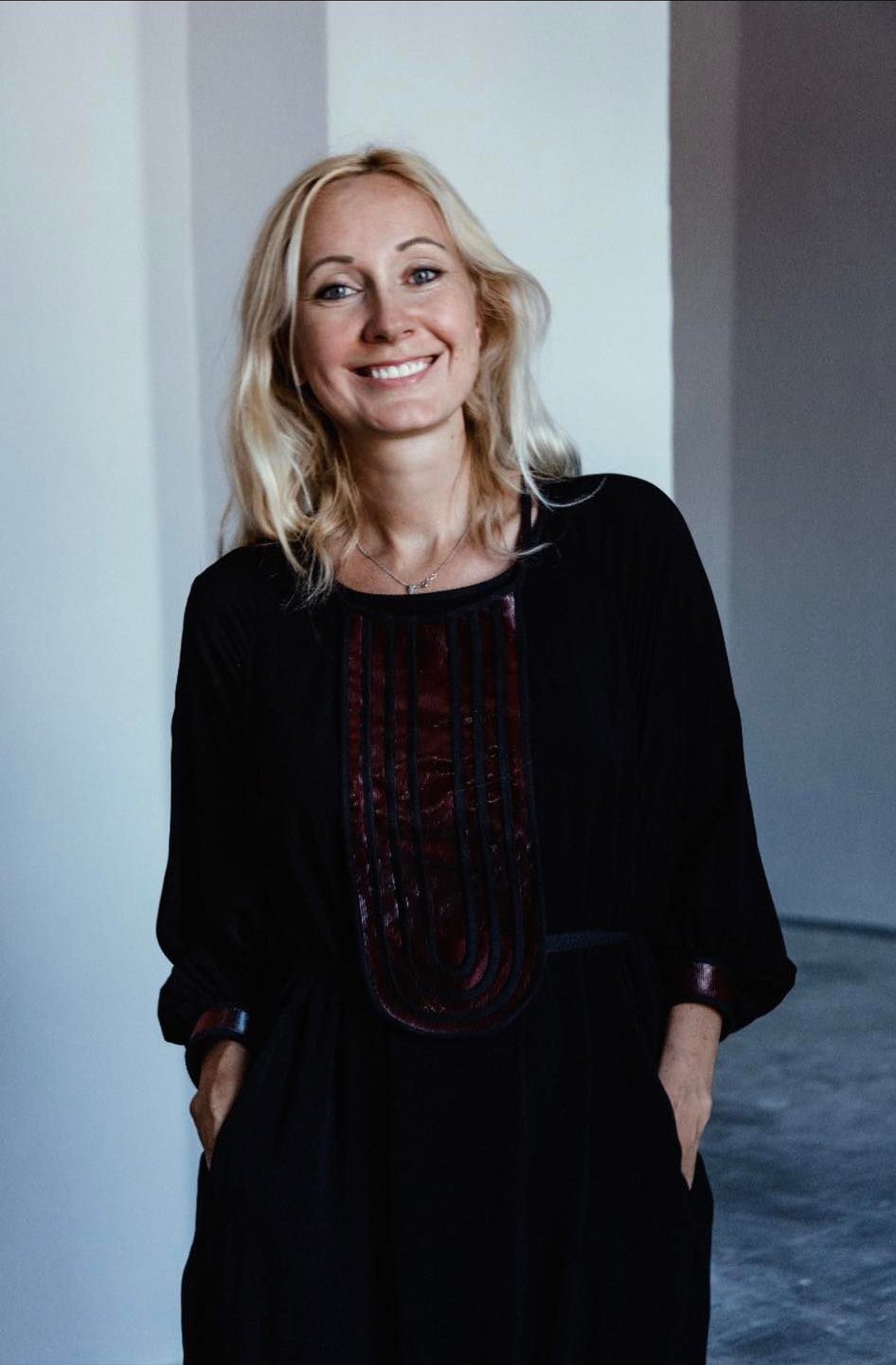It's no secret that after decades of existence within the framework of Soviet cinema, with its very clear instruction to educate "real Soviet people," the cinema of independent Ukraine had to go through a long and difficult path of rethinking and restructuring. It is still going through it now-with difficulties and struggles, with ups and downs-but stubbornly and consistently. The Maidan of 2004, the Revolution of Dignity, and the war were the catalysts that accelerated the transition of cinema from territorially Ukrainian to substantively Ukrainian. In all its complexity and diversity, including cultural and ethnic diversity, this is a vivid and interesting phenomenon worthy of detailed study. It is one of the facets of Ukraine's cultural and political history that is being created right now. Therefore, we will publish our conversations with those filmmakers who consistently create new, independent Ukrainian cinema: KILOK.art opens a series of interviews titled Decolonizing Ukrainian Cinema. Conversations with filmmakers".
The project was born within the framework of the research "Postcolonial and Decolonial Processes in Ukrainian Cinema after the Maidan and the Russian-Ukrainian War" of the Fellowship program within the (P)Ostkolonialismus research area of the Pilecki Institute Berlin. Our first conversation is with the filmmaker Daria Onyshchenko
Darya Onyshchenko (b. 1983, Kyiv) is a Ukrainian-German film director and screenwriter, activist. She graduated from the Taras Shevchenko National University of Kyiv (2004, specializing in international journalism). In 2006-2013, she studied feature film directing at the University of Film and Television in Munich; her graduation work was the feature-length drama Istalgia (2014) on the topic of migration. She lives in Munich, but works consistently as a Ukrainian filmmaker: "The Forgotten (2019) tells the story of resistance to the Russian occupation of Donbas, Malevich (2024) rethinks the figure of one of the key figures of the world avant-garde, debunking the myth of the artist as "Russian".
Daria Onyshchenko is a member of the German film agency Above the Line, the Ukrainian Film Academy, and a screenwriter at 435 Films, Directory Films (Ukraine), Lehmann Sisters (Switzerland), and others. She is an active representative of the Ukrainian diaspora in Germany, which has been regularly organizing Ukrainian events since the beginning of Russia's full-scale invasion of Ukraine. In March 2022, at the Bif&st Bari International Film Festival in Bari (Italy), the filmmaker, as a representative of the entire Ukrainian film community, received the prestigious Federico Fellini Prize.
Daria Onyshchenko: "This is our struggle for existence as a state, but above all, it is a struggle for freedom"
- How has your vision of the cultural identity of Ukrainians changed?
- My vision of Ukrainian identity and my own identity changed a lot during the Maidan. I grew up in a family with very different views on our history and culture. Some relatives were dissidents, survived the Holodomor, knew and appreciated Ukrainian culture; some, on the contrary, supported the Soviet government and worked for it, and later felt nostalgic for the "soviet" and adored the "great Russian culture." As an adult, I truly realized the terrible damage that centuries of Russification had done to my generation. Throughout my childhood and adolescence, I spoke mostly Russian, and I consciously switched to Ukrainian only in 2014. It was a conscious and final choice. Since 2014, I began to discover new pages of our history, read books that gave me a completely new awareness of who I am. Since then, I have devoted most of my life to actively fighting for our national idea, for our independence, and to fighting Russian propaganda. I realized how much the years of Russification prevented me from learning my native language and culture, I realized how much, even at the family level, Soviet propaganda brainwashed me with the ideas of imperialism, and I developed a very strong protest against Russian and a desire to make political films that would tell Ukrainians and the world about our culture, about the threats of Russification, about the influence of propaganda, and, ultimately, about our liberation struggle. The idea that culture should be outside of politics became absurd to me in 2014. Now someone may consider my films nationalistic, but in a time when there is a war, you just have to choose which side you are on. And I can't make films on topics that are not related to the war now, because I feel all this boiling inside me, and I want my work to make a small contribution to our common victory.
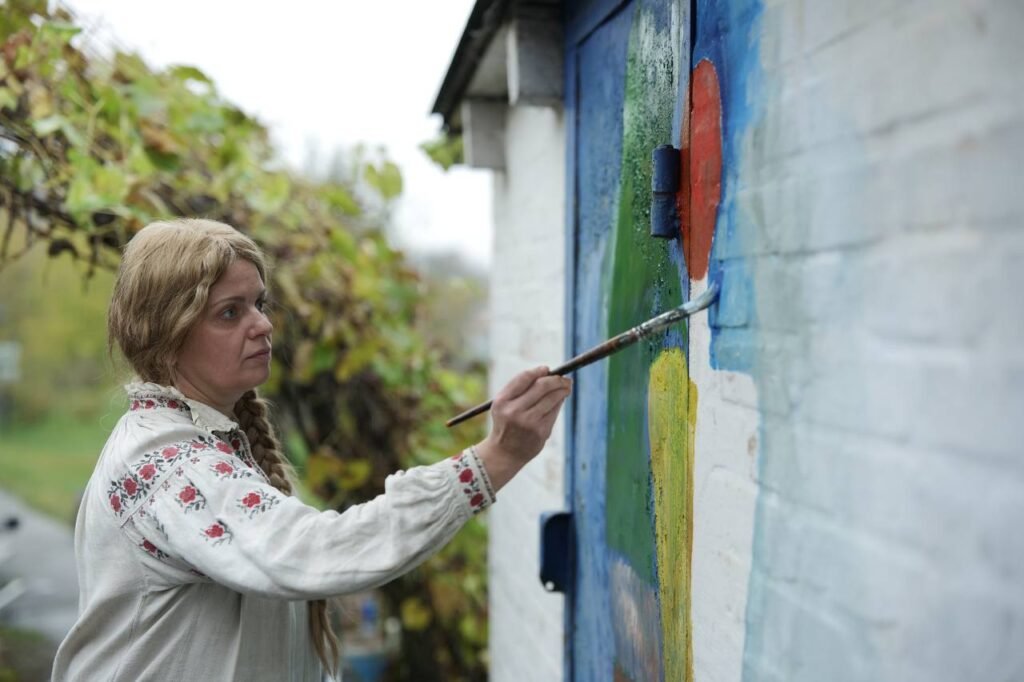
Irma Vitovska in the movie Malevich. Switzerland, Ukraine. 2024.
– In Istalgia (2012), the Kyivan character in the first version of the film still speaks Russian, and in Malevich (2024), the goal is to "return" the famous artist to Ukraine...
- Istalgia was the first co-production in Ukraine to be shot in accordance with the European co-production convention. It was a very interesting movie at the time. I had just finished my studies at the Munich Film and Television Academy, and I was fascinated by European cinema with a realistic aesthetic. It was important to me that the characters speak naturally, in the language they would use in real life. We know that many people in Kyiv still speak Russian. In this sense, everything in Istalgia is depicted honestly. It was a year before the Maidan. This movie is now a portrait of that time. In many ways, it remains relevant. I love this movie very much.
- The Forgotten is a film that reminds us of the Ukrainian identity of Donbas residents. Tell us more about this dimension of it.
- "The Forgotten" tells about the persecution of the Ukrainian language in the occupied territories and raises the topic of the threat of Russian propaganda. The film was released in 2019, and back then many people told me that I was exaggerating this threat. And now the film looks like a sad prediction of everything that happened a few years later... We still sometimes show The Forgotten in the West. This film is of great interest to foreigners who want to better understand the reasons for the Russian war against Ukraine. The script for The Forgotten was based on interviews with residents of the occupied territories. The script is based on the true stories of our Ukrainians from the underground and the occupation. I had a collaboration with the famous sculptor Maria Kulikovska: we talk about the prison "Izolyatsia" and symbolically shoot Maria's sculptures, which were destroyed by the occupiers there at the very beginning of the war. This film is my own pain, my own search for identity, and a tribute to those people who continue to fight underground in the occupied territories. We have all failed to do much to prevent a Russian attack in 2022. Not only the West, but also our Ukrainian society continued to ignore the occupation of Donbas, the annexation of Crimea... People in Kyiv lived as if the war did not exist. No one wanted to recognize the threat of Russian propaganda. Business with Russia also continued in the cultural sector. "The Forgotten is a movie about this. I tried to reach out to those people who still did not believe that sooner or later Russia would want to destroy the whole of Ukraine. I was already convinced of this when we were shooting The Forgotten.
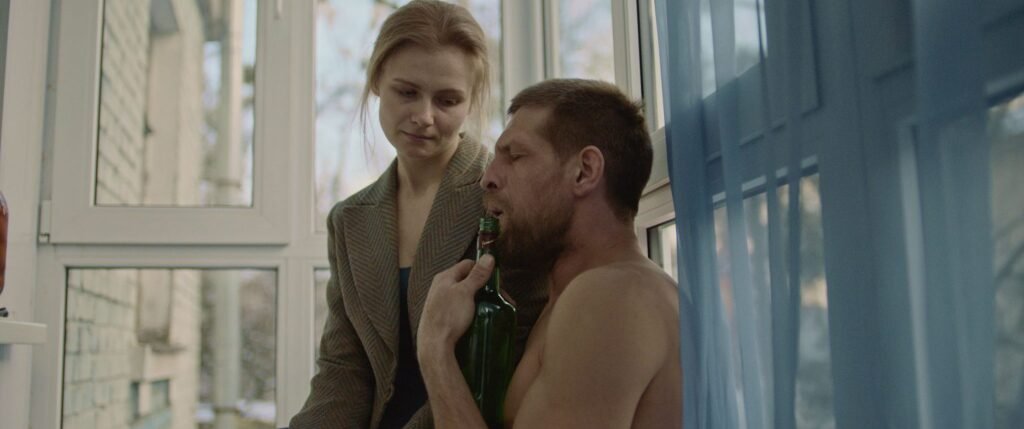
Maryna Koshkina and Vasyl Kukharsky in the movie The Forgotten.
- Let's talk about your latest film Malevich. The artist is presented there as a Ukrainian artist...
- My films are not commercial films, but author's films. It is my own vision of the topics and reality that I depict on the screen. The demand for such films is, of course, much lower than for American blockbusters, comedies or detective stories. Author's cinema has its own audience. My first two films, Istalgia and The Forgotten, had a successful festival career. "Malevich is a slightly different project. This is my first historical movie. But this is not a classic historical biopic. The war made a lot of adjustments to the film already at the stage of scripting and production. We were shooting Malevich at the very beginning of the Russian invasion, at the moment when the first heavy shelling of our energy sector took place. No one knew what would happen tomorrow, whether we would all exist at all. I was thinking that maybe this is the last movie we will be able to make here in Ukraine. That's why we integrated modern history and elements of our reality during the war into the film. This line is not accepted by everyone because it violates the rules of the classical historical genre. But it is this line that draws clear historical parallels and shows how Russian imperialism during the Russian Empire, Soviet times, and even now is doing the same thing-trying to destroy our Ukrainian nation, and with it our language and culture. This film is again my own vision of Malevich and his work through the prism of war. It is my interpretation of his life, but, of course, it is based on the study of many historical facts. The film will be released in cinemas in the spring of 2025, and it has the potential for a good release in Ukraine. I see a lot of interest in the name of Malevich now, and in general in the topic of returning our cultural heritage to us, which was appropriated by the Russians. But this film is also a good tool for cultural diplomacy. We are planning diplomatic tours: for example, the film was shown in Munich during the Security Conference, when politicians and the press from all over the world gather in Germany.
The main idea of the film is to tell about Malevich's identity, his authorial consciousness, which was very closely connected with Ukraine. That is, we are not trying to label him as a Ukrainian artist. Malevich was a Ukrainian-Polish-Russian artist. All three countries played a big role in his biography... Four, to be exact: Belarus as well. But what exactly shaped his inner world, his very deep philosophical dimension? In my opinion, the love of the Ukrainian village, Ukrainian folk art, the Ukrainian language, and Ukrainian songs gave Malevich a lot of energy, which can be seen in various manifestations of his work. He turned to elements of Ukrainian folk art in his most famous period, the period of Suprematism. He devotes a number of works to the Ukrainian peasantry in the late 1920s and early 1930s, and dares to depict the famine in the countryside in some of them, although he realizes that this could cost him not only his career but also his life. Malevich went through many difficult trials in his life. When the Communists came to power, he hoped, like many artists of the time, that the new government would give freedom for creativity and support avant-garde artists. But very soon, artists like Malevich found themselves as tools of Soviet propaganda. And then the question arose: who among them was ready to continue to serve this propaganda. People like Malevich turned to protest and very quickly became enemies of the system, a threat to it. Everything that happened then is very similar to the current events of the Russian invasion. We see how many of our artists are now fighting at the front, we know how the enemy is trying to destroy our culture in the occupied territories, we feel how much we as Ukrainians have realized the importance of returning the names of our artists stolen by Russia, and how much we all still need to study and learn about our own culture. I do not aim to shout everywhere that Malevich is a Ukrainian. In his views, Malevich was a man of the universe, a man beyond borders and passports. I want more young people, more Ukrainians and foreigners to learn about his work related to Ukraine, and to learn about how heroically the artists of Malevich's generation and my generation are fighting for their freedom and the right to be Ukrainians, to create on their native land, to paint, create music, make films about Ukraine, in Ukraine. This is our struggle for existence as a state, but above all, it is a struggle for freedom, which makes this film very universal and understandable for different categories of viewers. We are all fighting for our freedom now, just as Kazimir Malevich once fought for it, creating a completely new art of the future in a totalitarian country.
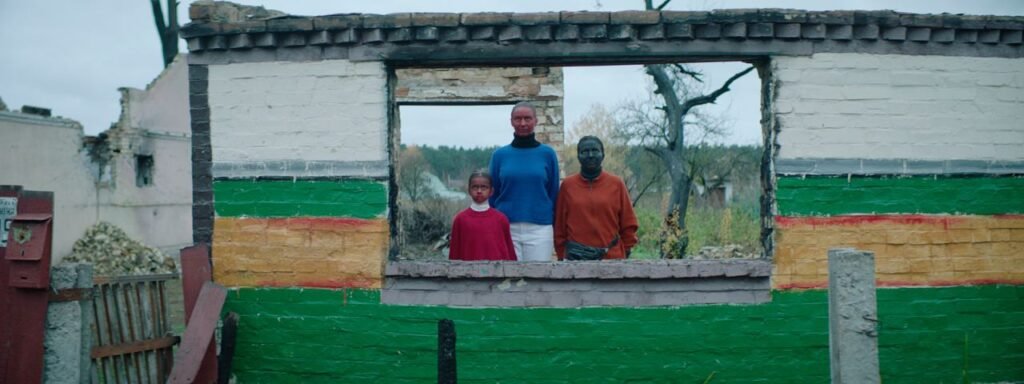
A still from the movie Malevich.
- Your films are outstanding examples of co-production. What advantages do you see in this, besides financial and organizational ones? Do you think co-production brings the Ukrainian film industry closer to the Western one?
- Co-production is a difficult form of filmmaking. The search for reliable co-production partners, complex and different financing systems in different countries make such projects very time-consuming to implement. They take years to complete. It's hard to live with one project, one idea, for several years and not have any guarantees that it will be realized. It requires faith and conviction that you, as a director, want to make this particular movie. But each co-production is also a very interesting experience of working with a team and partners from different countries, it adds a lot of interesting things to the project at every stage of production. This is an interesting international collaboration that shows that cinema can cross borders and unite very different artists for a common goal. Of course, this also gives us an opportunity to make the project interesting for an international audience and get it either to international film festivals or to international distribution.
- What are you working on now? What else would you like to shoot?
- For the past two years, I have been working for the German TV channel ZDF, filming television series. It's a new, but also interesting experience for me. These are purely commercial projects. But I really like how professionally and efficiently television production is organized in Germany.
Now I have another series in development. As for my own films, I want to continue researching our history and am preparing my next project together with producer Pylyp Ilyenko. It is a historical drama based on real events, which tells the story of the Dovzhenko Film Studio and the life of our great director-poet Yuriy Illienko. I really want to make this movie and shoot it in Ukraine.
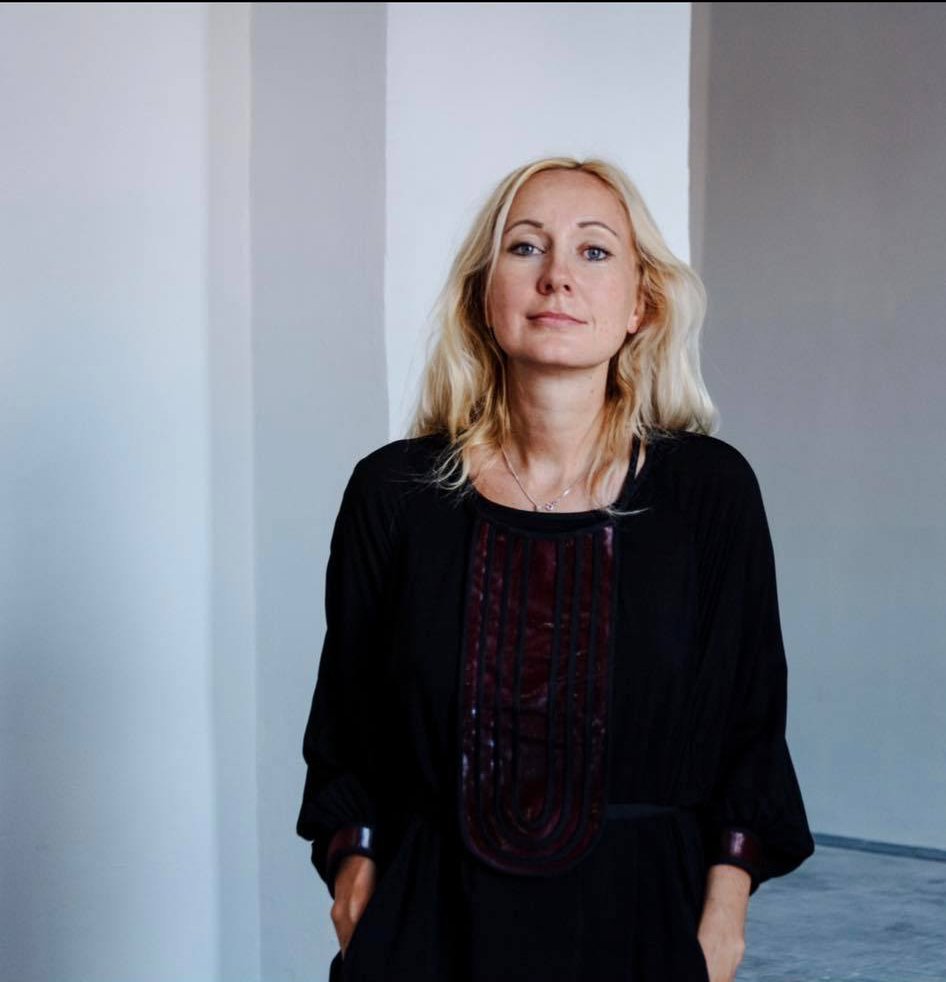
Daria Onyshchenko
